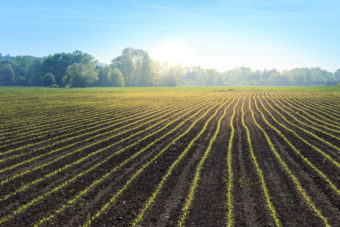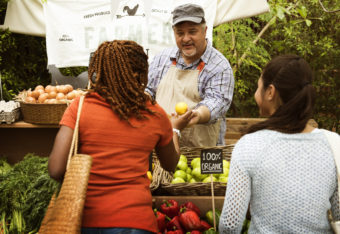From Conventional to Organic: Sustainable Farming is the Way to Go!
Posted: February 7, 2021 | By: Rocio Ramos
The quality of our food has changed drastically over the last century. If you were to go back 50 years and ask a grocery store attendant if their carrots were organic, your response to that would be a confused stare. “What is organic?” they might ask. Then, you’d explain to the attendant that for food to be “organic,” it must be grown without the use of pesticides, synthetic fertilizers, or bioengineering that might only further the confusion. That’s because during this time there were no apprehensions to using pesticides, fertilizers and other conventional farming practices. It was the only means of producing large quantities of food needed for an emerging population. Conventional farming has relied upon mass production and quick turnover, and while this farming method has been good for business, it’s come at the cost of our health and the health of the environment.
Conventional Farming Boom

After World War II the world saw a major population boom. During this time, conventional farming was considered to be the best, and only, method to keep up with the growing population. The agriculture and food industry needed methods to quickly produce large amounts of food. The goal of conventional farming is to maximize production. Key characteristics of conventional farming include the use of pesticides, fertilizers with synthetic ingredients, or bioengineering to ensure maximum output. Indeed, it was American Norman Borlaug who played a large part in the development of semi-dwarf, high yielding, disease-resistant wheat varieties that are used by a majority of wheat farmers today.
Still, what seemed to be the answer to feeding a large population with this new “super wheat,” and other conventional farming methods, soon became a concern. Ecologists and sociologists alike began to question the methods of conventional farming. According to them, these methods reduced soil fertility and genetic diversity, increasing soil erosion, leading to long-term vulnerability to pests, thus affecting the health and yield of crops.[2]
Fast-forward 50 years, and we are now faced with the consequences of conventional farming: low-quality food products, high-carbohydrate diets, contaminated soils, and many other health and environmental concerns. The potential solution to this problem: sustainable farming.
The Sustainable Farming Solution
Unlike conventional farming, sustainable (organic) farming focuses on sustaining the health of soils, ecosystems and people; rather than use of add-ons with adverse effects. Sustainable farming sacrifices the use of pesticides, herbicides, and fertilizers in order to ensure healthy soil, natural processes and the well-being of the plants. It uses traditional methods of farming, focusing on cycling soil and growing seasonal crops, regardless of production size or demands of the population.
Are All Sustainable Farmers Certified Organic?

Still, one of the questions most individuals have is: Does it need the Certified Organic stamp? Many farmers that sell their produce at local farmers markets do not carry the Certified Organic seal, however, still practice sustainable farming. The best way to find out how the produce was grown is to ask the farmer. Also, you can check out the following article “Difference Between Organic and Certified Organic” to learn more about the certification process and what makes something organic.
The benefits of consuming organic foods and using organic products are numerous. According to the article “Organic Foods: What You Need to Know About Eating Organic,” organic foods contain fewer pesticides, are richer in nutrient value, are free of GMOs (Genetically Modified Organisms), and are better for the environment. Plus, organic farming generally produces less waste, conserves water, reduces soil erosion, increases soil fertility, and even uses less energy. Overall, organic foods and products remain true to their basic structure and to traditional farming.
When consuming organic products, you’re not only supporting your health, but also the farmer who took the time to care for the plants and show a healthy respect for Mother Earth. Unlike conventional farming, sustainable farming takes much more effort and time, which is why organic foods come with a higher price tag. But when considering the health and environmental benefits, paying a few cents more for an apple that you know isn’t going to contain pesticides and GMOs, may be the most healthful decision you can make.
And though you may not always be able to consume organic products, you can always ensure you’re receiving the nutrients you need with the 90 For Life™ products. You can also, start your own tiny farm and use Youngevity’s Bloomin Minerals Soil Revitalizer to get your plants off to a great start. And remember to always to do your best to support organic farmers!
Posted in:

